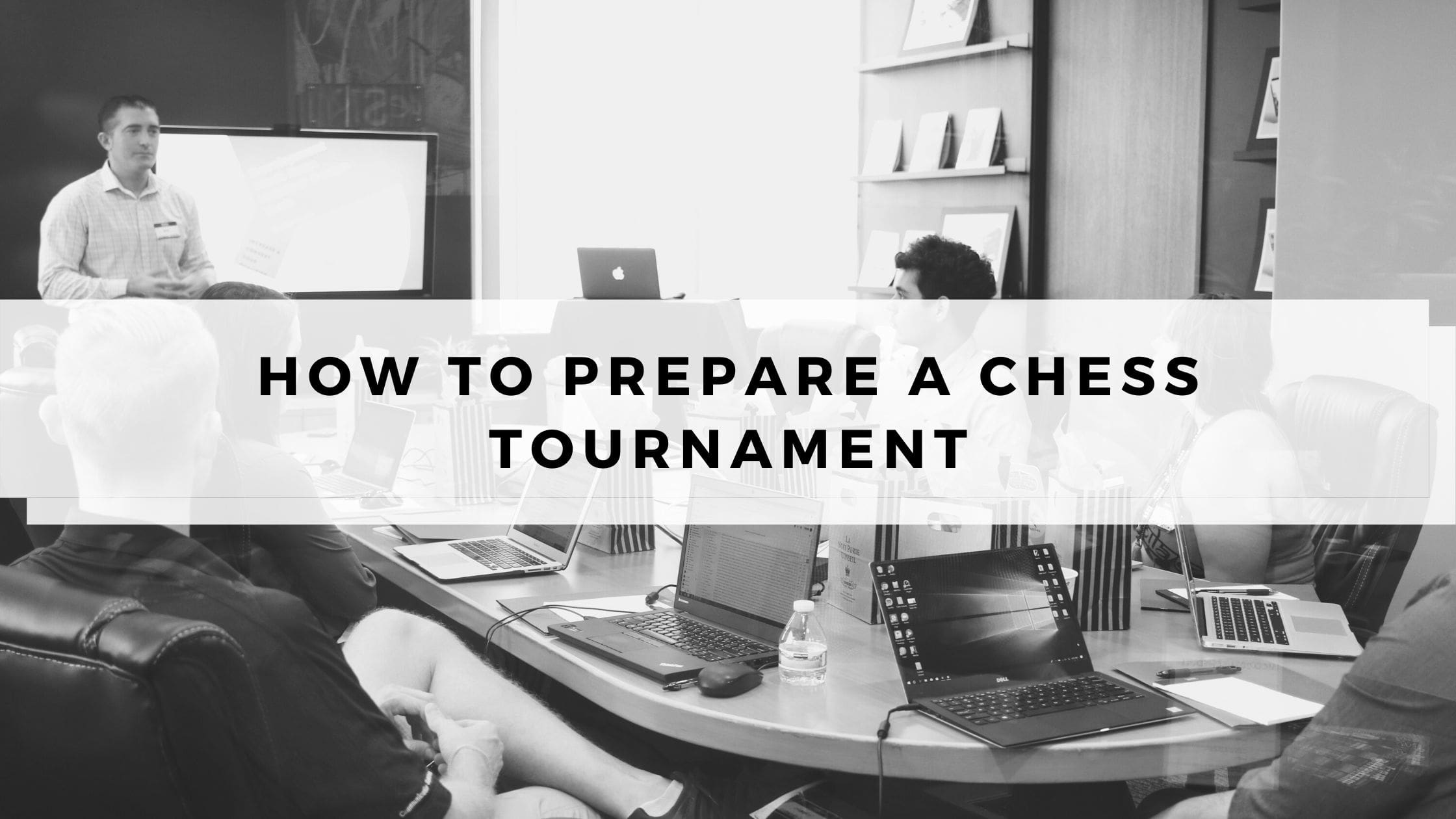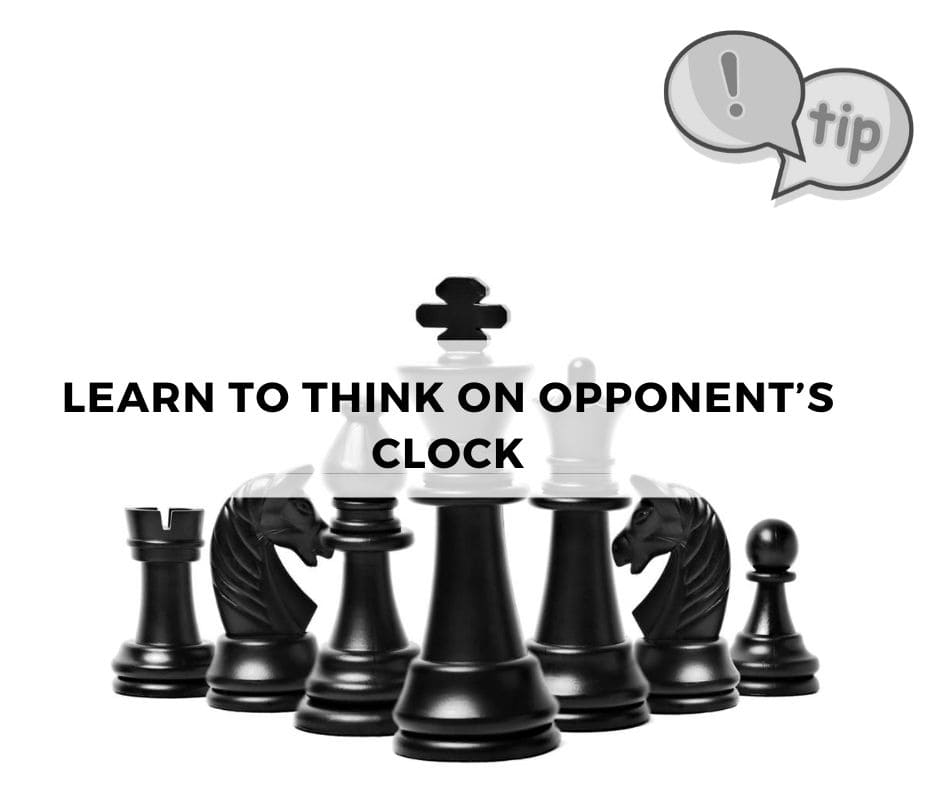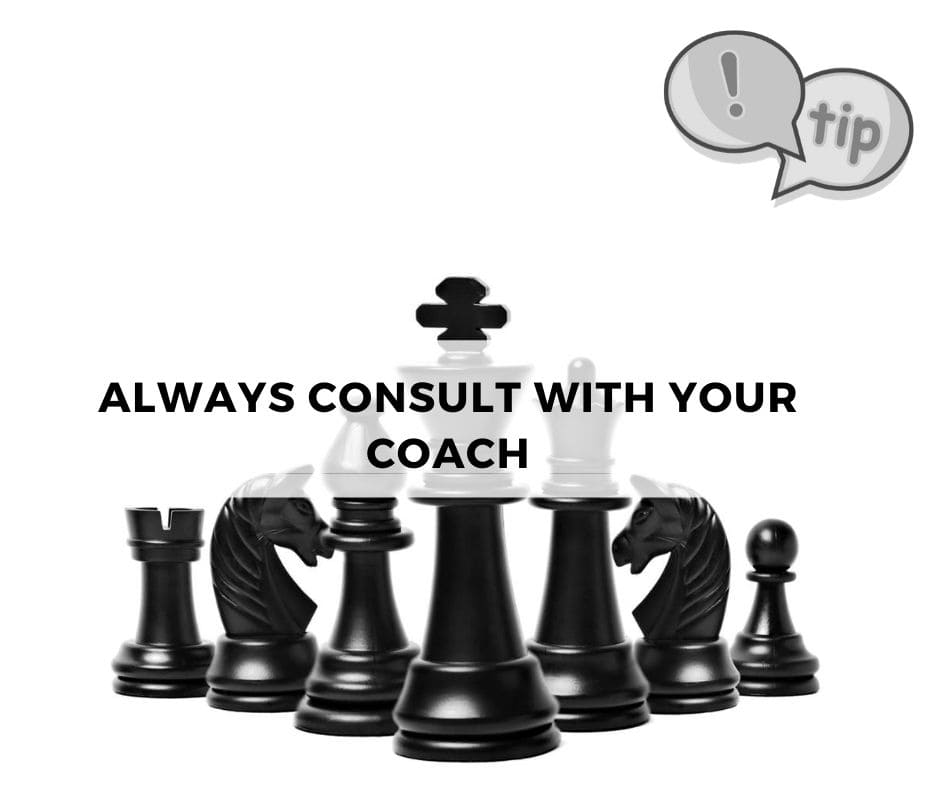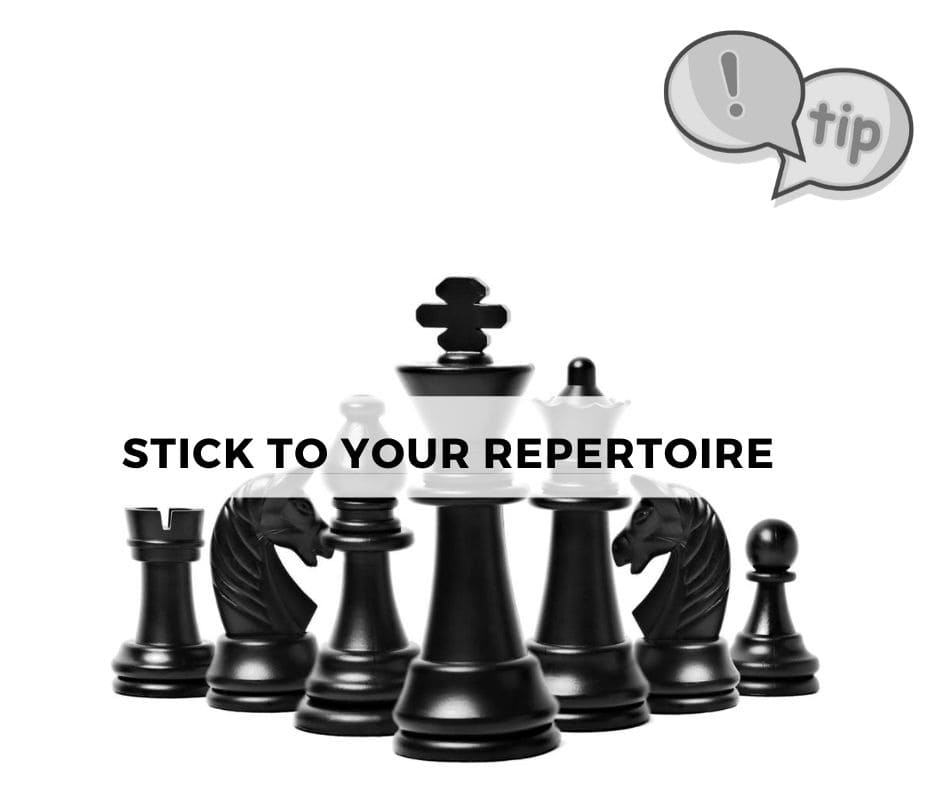How To Prepare a Chess Tournament

1: Do NOT play bullet chess

I don’t mean that you don’t have to play speed-chess at all. I don’t intend to discourage you from playing online either.
Simply, bullet is useless. One (or two) minutes chess is just a waste of your time. Time that you can use in a much more productive way.
First of all, your brain is basically in idle mode during a bullet game. You just play move after move based on intuition. Intuition is a good thing to have at chess, but there are better ways to improve it.
In second place, bullet chess does not allow you to practice any of the other important parts of the game, maybe with the partial exception of the Openings.
You will NOT calculate variations, when playing bullet. Nor are you going to evaluate strategical plans. You will NOT search for positional patterns and you will NOT evaluate transitions from middle-game to endgame.
All in all, playing bullet is BAD. And it is especially BAD in preparation for a chess tournament. Keep your brain active, up and running with some more intelligent chess activity.
2: DO play blitz chess

Now you are talking chess! Blitz is a different affair. And it can be good.
First of all, choose a decent clock. My suggestion is 5’+0" (no increment). But also 3’+2" and 5’+1" make sense.
So, why blitz and not bullet? Those few minutes that you add on the clock make all the difference in the world.
With 5 minutes you have enough time to:
- Focus and warm-up your brain.
- Bring into your working memory your favorite Opening Variations (it should take 10-20 seconds, that you don’t have in bullet).
- Take a good amount of seconds to calculate variations, even tactically quite complex, sometimes.
- Give a meaning to each move, so that it make sense to review the game afterwards.
Bullet is just a sequence of random moves. Blitz make sense, chess-wise. This is why, once the game is over, you MUST analyze it.
Don’t lie to yourself by saying “what should I analyze, it’s just blitz”. Wrong. You can analyze a lot of things for each blitz game you play.
- Bring up you Repertoire and check if you played according to it, or if you forgot something, or confused some variations.
- Analyze with the chess engine the tactical moments of the game, understand what you missed and whatnot.
So, for each blitz game you play spend the next 10-15 minutes doing some analysis. You can also update your Opening Repertoire if you find something interesting.
This way you can play two blitz games per day and easily get 30 minutes of meaningful chess practice. It’s a nice, relaxing and effective way to spend half an hour even during a chess tournament.
3: Solve 2 easy puzzles before each game

Nothing changes yourself like introducing new habits. Habits make a man (and a woman).
Calculating chess variations must become a habit for you. In different words, do you know the process your brain starts when calculating variations and combination? Do you know the feeling it produces? This feeling must become natural to you.
Even in preparation for a chess tournament, keep solving two easy chess puzzles every day. Each and every day.
There are a lot of ways you can do this. My favorite way is simply to run the LiChess mobile app (free) whenever I have a moment (drinking a coffee, or in the bus) and swipe from left to right (it will show the menu) and then in the “Learn” section click on “Training”.
This will open up a chess puzzle. When you solve it, it will immediately open up another puzzle. The awesome thing is that the difficulty of each puzzle is based on your personal score, so it will increase as you improve.
I bet you’re busy. We all are. In fact this blog is about how to practice chess with a full-time job. So keep the number of puzzles solved each day to 2, or 3.
Do it even during a chess tournament. It must become a habit like coffee is in the morning.
4: Eat differently

Here we go into something more technical. During a chess tournament, to prepare at the best your body for the next game, it may make sense to change a little bit your nutrition.
So, what to eat during a chess tournament? You should look for lighter, easy to digest, food with high-quality proteins.
Fish is perfect in this sense. To avoid eating fish every day, also eat fat-free meat or eggs. Give priority to fish though.
For carbo, choose more refined flour, as it contains less fat. Pasta is also good.
Tend to avoid cheese, as long as possible. Milk and yogurts are included in the “cheese” family. Definitely don’t eat lots of them.
Have a lot of vegetables, but this is something you should do anyway, not just to prepare a chess tournament!
During the game, do NOT eat too much sugar. It will only make things worse when you run out of it you will have low blood-pressure.
Remember one thing about nutrition. Good common-sense is the most important thing about food. Avoid garbage-food, try to vary a lot, get a lot of vegetables and select high-quality elements. During a chess tournament, slightly prefer high-quality protein and refined carbo, while diminishing fat.
5: Sleep more

I will keep this simple. Everything you do that is outside of your common schedule will demand a bit more rest than usual.
If you go take a run, then you should sleep a bit more that night. When you swim, the same. If you play a chess game then, the same.
During sleep, our body eliminates bad toxins from the brain, and creates new neural interconnections (yes, you read it well: NEW neural connections). If you don’t believe me, just check online. My source was the video course “Learning How to Learn” (free).
So, during a chess tournament, go to bed early. Stay 30/45 minutes with darker light, maybe reading a book. Avoid flashy TV or video-games. Use earplugs if you think there might be noise. And stand up when you feel rested.
6: Wake up earlier

To sleep more does not mean to be lazy and sleep in. Chess is a dynamic activity and it requires a dynamic body.
In most tournaments, games are played after lunch (2pm or 3pm somewhere). This does NOT mean that you can sleep until 11am. Rather the opposite.
Wake up early. If 7am sounds bad, then 8am should be your time. Have a good breakfast (see #4: Eat well, above). Take a walk to wake up your body, or even a short run. Do not stress your muscles if you run, 20 minutes of easy running will be fine.
Then you can go back to your room with an active brain, active and well nourished body, and start preparing the next game.
7: Prepare a smaller version of your Opening Repertoire

If you followed my advice about Chess Opening Repertoire, then you are going to like this one.
Take your complete Opening Repertoire file, and open it with you favorite chess software. In my case, this is either ChessBase or LiChess. Both are available online, which means you don’t need to carry with you any hard-disk or such.
Now, create a new file and call it “MyOpening-small”, or similar. Your objective in this file is to put a minimal number of lines for each of your favorite openings. The goal is to have a file that can bring up in your working memory many variations very quickly, without getting lost in a deep analysis tree.
Let me try to clarify the concept even further. If you studied, let’s say, the King’s Indian Defense, then you have for sure a big variations tree with lots of comments and personal notes about positions in this opening.
This is correct, from the point of view of Opening Theory: you did well. However, in preparation for a chess tournament you need something lighter than that. You need something that you can quickly scan through in order to recollect your knowledge about the entire variation.
So, do the following. Select the most important 15 lines of each Opening in your repertoire, and copy them over into your new “small” repertoire. Do NOT write comments in English (or your tongue) in this file; use only the chess notation (such as +/=, -+, !, etc.).
Then, during a chess tournament, or when preparing a tournament game, go FIRST through this smaller file. This will help you to remember more quickly what you know about that Opening, what type of positions you should aim for and what positions you should avoid.
Then, if you still have time, you can open your real Opening Repertoire and check out the more detailed analysis for that Opening.
8: Decide your next Opening before going to sleep

Have you ever heard the piece of advice that say “Today before going to sleep write down on a piece of paper what you should do tomorrow”?
During a chess tournament you should do something similar. Avoid party and overlong dinners at night. Instead, get back early to your room and start thinking about what kind of game to play tomorrow.
You should use a database, the largest you can find, in order to check some games that your next opponent has played in the recent past.
Then, using these information, you should decide what Opening you will be playing. Do this in the evening. Do NOT postpone this decision. It should not take too long anyway.
I am not telling you to choose exactly what sub-line in what variation of your Opening tree to play. Just choose the Opening you’ll play, before going to sleep. You will have time in the morning to refresh your knowledge about that Opening, and also to select more in detail the line that you want to play (follow my advice #5: Sleep more, and #6: Wake up early).
9: Don’t analyze your games

You should really avoid analyzing your tournament games in depth, during the same tournament.
The one thing you SHOULD really do is to analyze each game with your opponent right after you’ve finished. This is good and useful analysis. In fact, take notes of the lines that you discuss with your opponent, because these lines say a lot about your reasoning process during the game. You can even write these notes on your score-sheet’s copy.
But do NOT go in your room and spend hours analyzing the position you have just played. This is task for future weeks/months.
I absolutely know the feeling you have at the end of the game. Don’t forget I am a chess player too!
It feels like you need to know the truth. You need to know if your idea(s) made sense at all, or not. And if it was just a tactical blunder, or not.
Here’s my suggestion on how to deal with these feelings. Write down every question you have about one game. Use your phone or a piece of paper, it does not really matter, just write them down and be sure to not loose these notes.
This way, you’re sure that your questions will be answered soon. Right after the tournament ends, in fact. But don’t do it during the tournament.
It would waste your energies and some precious time. The only thing you may (and, in fact, should) check while the tournament is still in progress, is whether you badly handled the Opening stage, because you might play again the same Opening in the same tournament, and it would be stupid to not check it.
Do not even look at the rest of the game. You have more important things to do in preparation for your next tournament game.
10: Stay close to the playing venue

This will depend on how much you can spend. Sure, if the tournament is being held in your town then do not move from you apartment!
But if you are travelling to a different destination, then try to find something as close as possible to the tournament hall.
Many tournaments are held in a hotel, so the best option would be to stay in the same hotel. Whether possible or not, it will depend on the rooms’ availability and on how much you can afford spending for the whole tournament.
If the hotel is not a viable option, then my suggestion is to try to find a room in an apartment very close to the playing venue. When I went to the Benidorm Chess Festival I found a great room for one fourth (1/4) of the cost of the hotel room just 1 minute walking away. I simply used AirBnB.
Staying as close as possible to the playing hall will allow you to take a healthy but short walk every day. You don’t want to walk too much and maybe be sweating or slightly tired at the beginning of the game.
11: Revisit your old games

I said you should not look at your current games, during a chess tournament. However, it is a really good idea to take a fresh look at your old games.
This says a few things implicitly:
- Always write down every game of yours in a chess software.
- Carry with you (digitally, not physically) the database with your (analyzed) games.
- You must analyze your games seriously!
Some say that you should compile a table with all your errors. Divide the errors you make in chess into groups, for instance, “tactical blunder”, “too long think”, “wrong positional plan”, and so on. Then, for each of your games that your analyze (thoroughly!), fill the details into this table about the mistakes you’ve made.
This self-improvement strategy will help you clarify what are your most evident weakness, work to improve and prevent them.
When you prepare for a chess tournament, go through your old games and you Errors’ Table. Give yourself a pep-talk and convince yourself you are not gonna make so many of them anymore!
12: Use a cloud solution for your database

You will find much much easier to have all of your games safely stored in some online database. I don’t think there is any privacy issue for a bunch of chess moves, so I warmly recommend you to do it.
For me, just the thought of leaving my laptop at home is relaxing. When I go to a chess tournament I don’t want to carry it with me, if possible. Having my database and Opening Repertoire accessible online from everywhere in the world is a great advantage.
You can do it for free even, for example using LiChess. It’s a website that allows you to play and study chess, for example by creating your own database. The advantage is that you can then access the website wherever you are. You don’t need your personal laptop, any computer would work (and an internet connection, of course).
The other alternative I recommend is ChessBase online. It’s not free, but for a very reasonable price in my opinion, and it offers a whole lot of features. Just to be clear, I do NOT have any affiliation with ChessBase.
13: Find an analysis partner

Chess players tend to be lonely wolfs. Nonetheless, I strongly encourage you to find one (or more) player that you get along well during the tournament. Do not underestimate the benefits of a little chat with someone.
If you succeed in finding such a person, then sure you will enjoy chess-breaks with him/her: lunch, dinner, etc. But my point is that you should also analyze with this person some position, discuss Openings and variations.
It’s impressive how talking with someone can enhance your vision of something. A little nuance in an Opening Variation that you never really noticed; An interesting way to speed up calculation; A great tip to keep focus during a tournament game.
Every player approaches the game in a different way. To get to know what other players do can be incredibly beneficial for your personal (chess) development too.
14: Build up your confidence!

Give yourself a pep-talk before each game. Seriously, both players start the game with the same pieces, so there is no reason why you should feel inferior to anyone.
Good moves are there, over the board. You just need to play them. And you trained seriously, so you will be able to find these moves.
This is the place where I struggle a lot. It’s not that I underestimate myself, but for some reason I often surprise myself thinking that everyone is better prepared than me, everyone plays faster than me, everyone…
It’s just plain wrong. I mean, not only this is a dumb approach to the game, it’s also actually wrong. It’s nowhere near the truth that other players have better preparation, or have better time-management skills than me. Really it’s not!
Yet, every now and then I find difficult to overcome this thought. This also a place where having a chess coach (or a mentor) can greatly improve your results.
But even if you don’t have any coach nor a mentor, trust me: the other players are just like you and have the same fears you have.
15: Rehearse your variations

Do you remember what you used to do before taking a test at school? I used to quickly go through the (detailed) table of contents and see if I missed any bullet point in my preparation.
Have you ever given a public presentation? Didn’t you rehearse your speech before actually talking in public?
You should use a similar approach with your Opening Repertoire. Sure, the most part of memorization was done while you built it. That’s the same it was at school, I believe: the act to study a subject (an Opening) at first produces the knowledge that will stay in your long-term memory for long time.
However, to rehearse Opening lines every now and again helps you to build stronger connections in your brain, and to solidify the knowledge you store in the long-term memory. Additionally, this will make it easier to bring up pieces of this knowledge into your working-memory (that’s what you use when you focus on something, like during a chess game).
I have spoken about this concept already in some previous article. Basically, open the Opening File that you want to rehearse in your favorite chess software, and go through the entire file. You can simply use the keyboard arrows to navigate the game, at much faster speed than you did the first time (when you actually built the file).
Going through the Opening file in this way will make perfect use of your visual memory too.
So do this exercise: when you prepare for a chess tournament, open up your Opening Repertoire (one file at the time), and “rehearse” the variations by navigating the file in a chess software in your PC or phone. Do it every time you have a few minutes free of other duties.
16: Find strong players with similar Opening Repertoire

If you are preparing for a Open Chess Tournament then I have an additional tip for you when you will be in the playing venue.
When you stand up and take a walk (hopefully while your opponent is thinking!), go closer to the top boards and see if any of the stronger players is playing a Opening that you have in your Repertoire too.
If you find one, memorize his name and do two things:
- During the tournament, go often to check his games to see how he handles positions that you play too.
- After the tournament, take a look at his games (use a chess database for this), again to see what his Repertoire looks like, and if had played any interesting ideas.
I would agree that you could do this with any stronger player, even famous ones, not necessarily one that is playing the same tournament as you. And in fact you should do that too.
However, I have found that being physically in the same place as a stronger player with a similar Repertoire to yours give additional motivations and pumps up your willingness to make additional effort and study chess! Do not miss the chance!
17: Do NOT stand up

I am aware that you are going to hate this one 🙂
I don’t mean that you can’t ever stand up. A bit of stretching is good during a chess game. Also, as I said in my suggestion #16, you can walk over the top boards to check if there is any interesting Opening line.
But that’s only at the beginning (during the Opening stage indeed). For the rest of the time you should not even look at any other board. Just don’t look!
Keep your brain completely focus on your game. When you feel the need to distract yourself a bit, then think about something completely different and very far from chess. Weather, food, sport, anything is fine.
But your games should be your only thought, chess-wise, during a tournament.
18: Learn to think on opponent’s clock

This is a tough one. At the least, I am almost never capable of doing it.
Optimizing your time-management by thinking while your opponent’s clock is ticking is… an art. I am nor even sure what you are supposed to do.
So here’s what I know about this subject, and what I try to apply during a game — not always with great results:
- in tactical positions, try to calculate during your opponent’s time. That’s not always the case, and you should not tire yourself, but often you can do it without too much of an additional effort.
- in quiet positions, then it’s really when you should make the most out of the time the opponent spends, because you should be able to make positional evaluations and strategic planning regardless (more or less) of his next move.
As I said, it’s tough. This is definitely something you should practice, somehow. If you have the chance to play some training game (with long time-control), then those games would be an excellent way to practice this part of the game!
19: ALWAYS consult with your coach

I will keep this one very very short. If you are preparing with a coach, a trainer, or a mentor, do NOT miss the chance to talk with him a few minutes every day during a chess tournament.
Ask suggestions about the next game, and also shares your feeling. They are players too, and are often better than the average player at handling stress, emotions, and other feelings that affect your performance over the board.
20: Stick to your Repertoire

This suggestion may sound strange. Why should not you stick to your Opening Repertoire, after all?
It’s a matter of confidence. I have seen a lot of times chess players choosing some random opening they are not very familiar with, simply because the previous game didn’t go very well.
If you loose a game with one of “your” Opening, your only reaction should be eagerness to improve your understanding of that Opening.
I know the feeling after you loose a game where you played a Opening that you studied and spent time on. It feels like a need for a change, and a need for some fresh air.
That’s okay, but Repertoire evaluation must be done when the tournament is over. Not during the tournament. If you prepared the tournament with an Opening Repertoire, stick to it, no matter what happens.
A bad plan is better than no plan.
Have fun!!